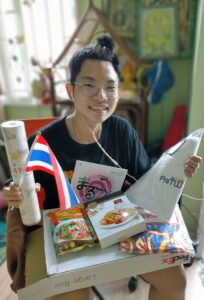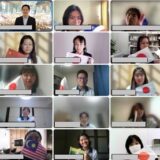Get to know ASEAN in Today’s World 2022
If you are looking for an opportunity to challenge yourself, build a portfolio, expand connections with friends and experts across ASEAN and others, let’s put ASEAN in Today’s World (AsTW) on your list.
This activity is a special multinational degree program for two weeks combined with the exchanging cultural activities. Due to the COVID-19, this year (2022) was held virtually; however, the organizers Mahidol University (Thailand) and Kyushu University (Japan) didn’t compromise with this obstacle, yet serve new experiences to all participants.
Next, I’m going to share my experience of supplement activities, core courses, and benefits.
Virtue Cultural Activities
Before we jumped into the core studies, we enjoyed some culture enlightening activities with good care from staff for the entire event.
After the application process, the first impression was a massive kit box filled with foods, clothes, souvenirs, and learning material for the upcoming event; on the opening day, we enjoyed Thai four-regional dance and remotely cooked Pad Thai and Som Tum Thai.
After that, we attended, exclusively, the 3-hour plenary lecture by Dr. Roger Y. Chao Jr., Head of Education, Youth & Sports Division of the ASEAN Secretariat about the overview and history of ASEAN, asian pacific affair and collaboration, ASEAN’ principles and regulation, idealism, utilitarianism, mobilities of ASEAN workers and students, and the next phrase of ASEAN. Also, it was a rare opportunity to discuss and share perceptions between the young generation and a regional leader.
On the last day, the boxing pants would be worn for Thai boxing activity which could be another great option of exercises.

Japanese Language class
For the core courses, all participants were required to choose Asian language course and ASEAN studies course, and my selection was the Japanese language and Social Innovation Incubation.
To begin with Japanese subject, emphasizing listening and speaking skills, the contents in a whole book combined with supplementaries covering basic conversations, vocabularies, and Japanese heritages.
In regards to course design minimizing the limitations during crisis, the learners could communicate frequently through practicing conversation in groups. We could not only practice Japanese conversation but to make good relationships despite remote study.
In the last class, we tried to present about our countries in Japanese as local aspects, so some information that we might not find in any press were presented such as urban myths, unseen spots, and local restaurants.
In addition, the instructor (sensei) was so supportive and always solved every problem for us, so we did not hesitate to ask her for any help.
Social Innovation Incubation
Another was Social Innovator Incubation which was a playground for learning and brainstorming for social innovation projects.
This subject was well designed covering all essential information for doing innovative projects which students of different backgrounds could learn together, so they would learn explanations, theories, social enterprise, critical thinking, creative thinking, working methods, pitching techniques, SDGs projects, various scales and fields of case studies, stress releasing, and others.
In addition, all topics were delivered by professors or experts in those fields from several institutes in Thailand. It’s a rare opportunity even if you would enroll in a university.
Since at the end of the course students in random groups were required to pitch their projects, the group had to manage all the processes by themselves. It was a good chance to improve working skills and practice problem solving such as tight timeframe, language barrier, different backgrounds, or different time zones. Meanwhile, we can exchange some information about our nations in other topics.
How does this program benefit me?
AsTW was not only an entertaining conference or serious academic event, but it was the occasion to improve both hard skills and soft skills at the same time.
We practiced English communication since all of the activities ran in English as a medium.
Moreover, through many activities in the event, we were not only making friends but also exchanging information regarding their countries which was one of interesting ways to learn ASEAN countries and others.
As I mentioned in Social Innovator Incubation, we have a chance to conduct working procedures among the group freely without hesitation, but there were more challenges because of working at different locations and limitations. In other words, I prepared myself for the working life.
Furthermore, I took the advantage of SDGs and sustainable development knowledge, which was in spotlight in society and business at this moment to finally get a job in this field and continue a career path.
Lastly, I would like to express my gratitude to Kyushu University (Japan) and Mahidol University (Thailand) offering a grant to participate in this amazing program which was my life changer.

